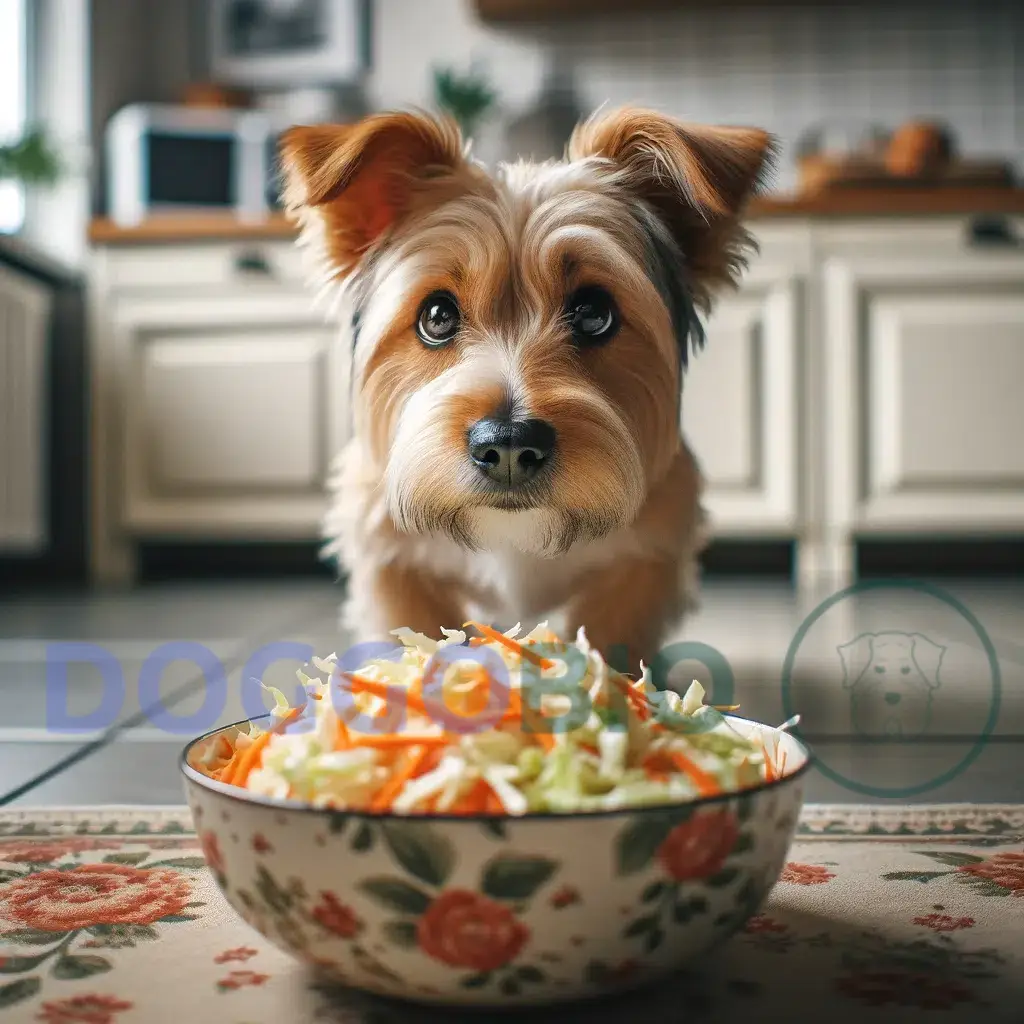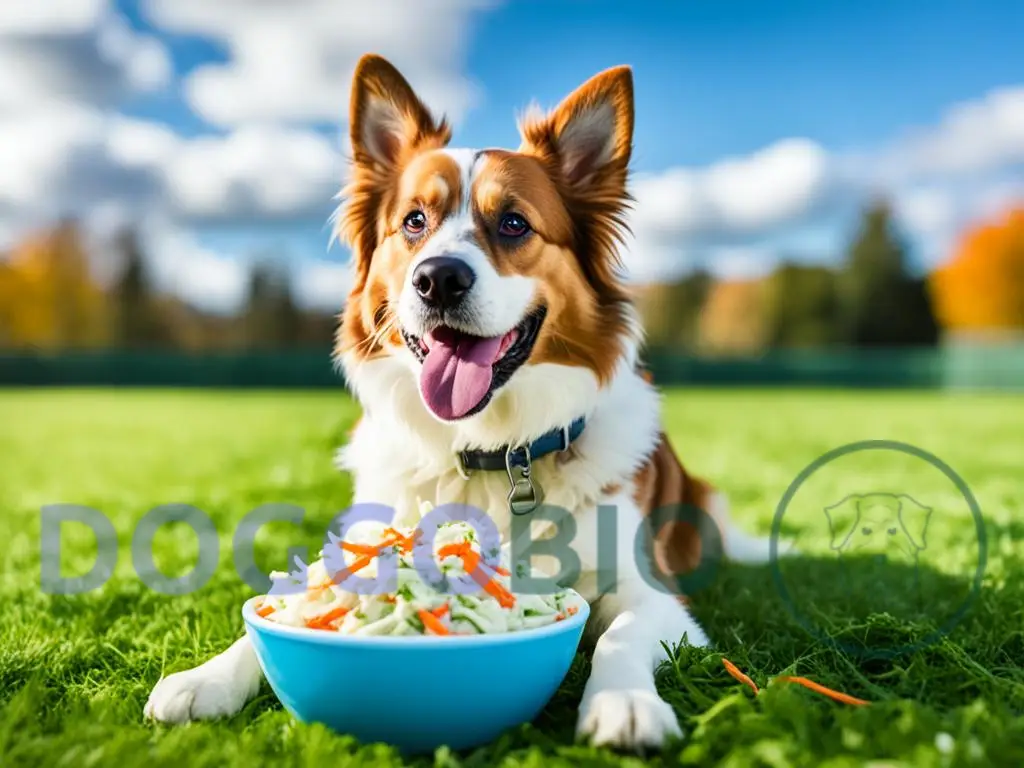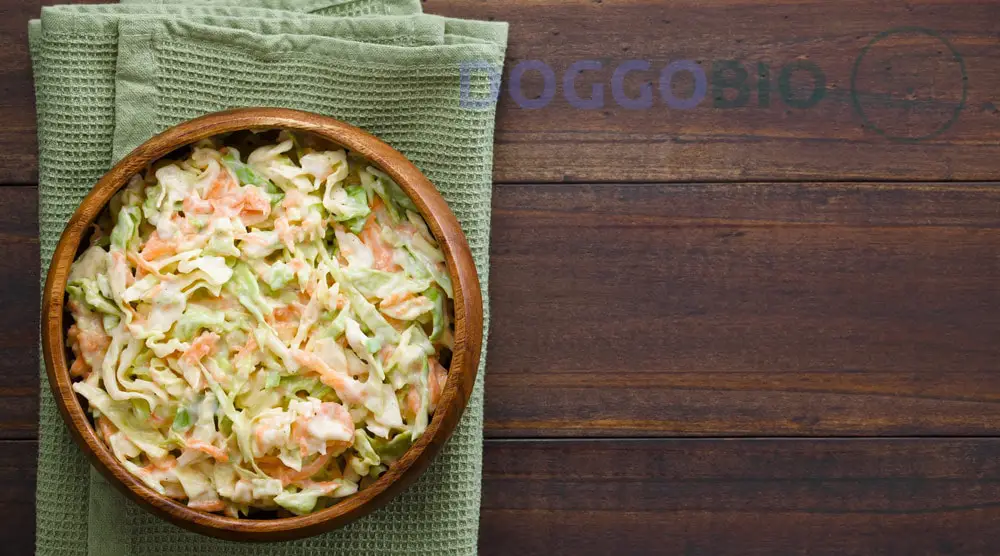Coleslaw, a famous salad made primarily of shredded cabbage and various dressings, is a typical side dish at picnics and barbecues. But when it comes to sharing this crunchy treat with our canine companions, a common question many dog owners ask is: Can dogs eat Coleslaw? The short answer is no. While the essential ingredients of cabbage and carrots are generally safe for dogs, Coleslaw often contains other ingredients unsuitable for canine consumption.
This article explores why Coleslaw isn’t a good choice for dogs and explores healthier alternatives to share with your furry friend.
Can Dogs Eat Coleslaw?
The short answer is yes, dogs can eat Coleslaw in moderation—however, there are a few things to consider before sharing this dish with your pup.
Risks of Feeding Coleslaw to Dogs
While Coleslaw is generally safe for dogs to eat, there are a few potential risks. These include:

1. Digestive Issues
Cabbage and other cruciferous vegetables, such as broccoli and cauliflower, can cause gas and bloating in dogs. This can lead to discomfort and even diarrhea. The high-fat content in mayonnaise can also upset your dog’s stomach.
To avoid digestive issues, only feeding your dog small amounts of Coleslaw and monitoring their reaction is essential. Stop giving them Coleslaw and consult your veterinarian if you notice any discomfort.
2. Allergies
Some dogs may be allergic to certain ingredients in Coleslaw, such as cabbage or carrots. If your dog has a known food allergy, avoiding Coleslaw is best.
If you’re unsure about your dog’s allergies, give them a small amount of Coleslaw and watch for any signs of an allergic reaction, such as itching, redness, or swelling. If you notice these symptoms, stop using Coleslaw and consult your veterinarian.
Benefits of Feeding Coleslaw to Dogs
While some potential risks are associated with feeding Coleslaw to dogs, there are also some potential benefits. These include:

1. Nutritional Value
Coleslaw is made primarily of cabbage and carrots, packed with nutrients that can benefit your dog’s health. Cabbage is a good source of vitamins K, C, and B6, while carrots are rich in beta-carotene, fiber, and antioxidants.
However, it’s important to note that Coleslaw should not be used as a substitute for your dog’s balanced and complete diet. It should only be given as an occasional treat.
2. Variety in Diet
Dogs can get bored with their food, just like humans do. Adding small amounts of Coleslaw to their diet can provide variety and make mealtime more enjoyable.
Just be sure to limit the amount of Coleslaw you give your dog and avoid feeding it to them too frequently. Too much new food can upset their stomach and cause digestive issues.
How do you safely feed Coleslaw to your dog?
If you’ve decided to share some coleslaw with your dog, here are some tips to ensure their safety:

1. Choose a Homemade Recipe
Store-bought Coleslaw often contains ingredients that may be unsafe for dogs, such as onions and garlic. Making your Coleslaw at home using dog-friendly ingredients is best to ensure your dog’s safety.
2. Avoid Dressings and Seasonings
Most dressings and seasonings used in Coleslaw contain ingredients harmful to dogs, such as onion powder and garlic powder. Stick to plain, shredded cabbage and carrots for your dog’s Coleslaw.
3. Feed-in Moderation
As mentioned earlier, Coleslaw should only be given to dogs in moderation. Too much of this dish can cause digestive issues and weight gain. Limiting the amount of Coleslaw and giving your dog a small spoonful as an occasional treat is best.
How Much Coleslaw Can Dogs Eat?
If you choose to feed your dog coleslaw, it should only be a small portion of their diet. As a general guideline, treats should not exceed 10% of a dog’s daily calorie intake. This means Coleslaw should be given sparingly and only as an occasional treat.
It’s also crucial to ensure that the Coleslaw does not contain harmful ingredients like onions or excessive dressing. When introducing Coleslaw or any new food to your dog’s diet, it’s advisable to start with a small amount and observe for any adverse reactions.
When can we discontinue the use of Coleslaw?
Coleslaw should be discontinued as a treat for your dog if any adverse health effects are observed. These can include digestive upset, allergic reactions, or signs of food intolerance. Dogs with pre-existing health conditions like obesity, diabetes, or pancreatitis should not be given Coleslaw.
If you are still deciding whether to include Coleslaw in your dog’s diet, it’s always best to consult a veterinarian. They can provide guidance based on your dog’s specific health needs and dietary requirements.
Some Posts You Wanna Read More
- Can Dogs Eat Potato Salad?
- Can Dogs Eat Cabbage?
- Can Dogs Eat Cilantro?
- Can Dogs Eat Egg Salad?
- Can Dogs Eat Horseradish?
- Can Dogs Eat Jicama?
- Can Dogs Eat Lima Beans?
- Can Dogs Eat Mushrooms?
- Can Dogs Eat Okra?
Frequently Asked Questions
Can dogs eat Coleslaw with raisins?
No, raisins are toxic to dogs and should never be included in their diet.
Is it safe for dogs to eat Coleslaw with onions?
No, onions are toxic to dogs and can cause serious health issues like anemia.
Can dogs eat Coleslaw with mayonnaise?
No, while mayonnaise is not toxic to dogs, it is high in fat and can upset their stomach if consumed in large amounts. It’s best to avoid giving your dog coleslaw with mayonnaise.
Can dogs eat Coleslaw with apples?
Yes, apples are safe for dogs to eat in moderation. However, removing the seeds and core before feeding them to your dog is essential.
Is it safe for dogs to eat Coleslaw with celery?
Yes, celery is safe for dogs to eat in moderation. Just be sure to cut it into small pieces to avoid choking hazards.
Conclusion
In conclusion, regarding the question, ‘Can Dogs Eat Coleslaw?’, it’s clear that this popular human side dish is not an ideal choice for your canine companion. While the primary ingredients like cabbage and carrots can be safe in moderation, the typical additions in Coleslaw – such as onions, garlic, and certain dressings – can harm dogs.
Pet owners must prioritize their dog’s health and dietary needs, opting for dog-safe vegetables and treats instead. Remember, it’s always best to consult with your veterinarian when in doubt about any human food. By being mindful of your dog’s diet, you can ensure they remain healthy and happy.
